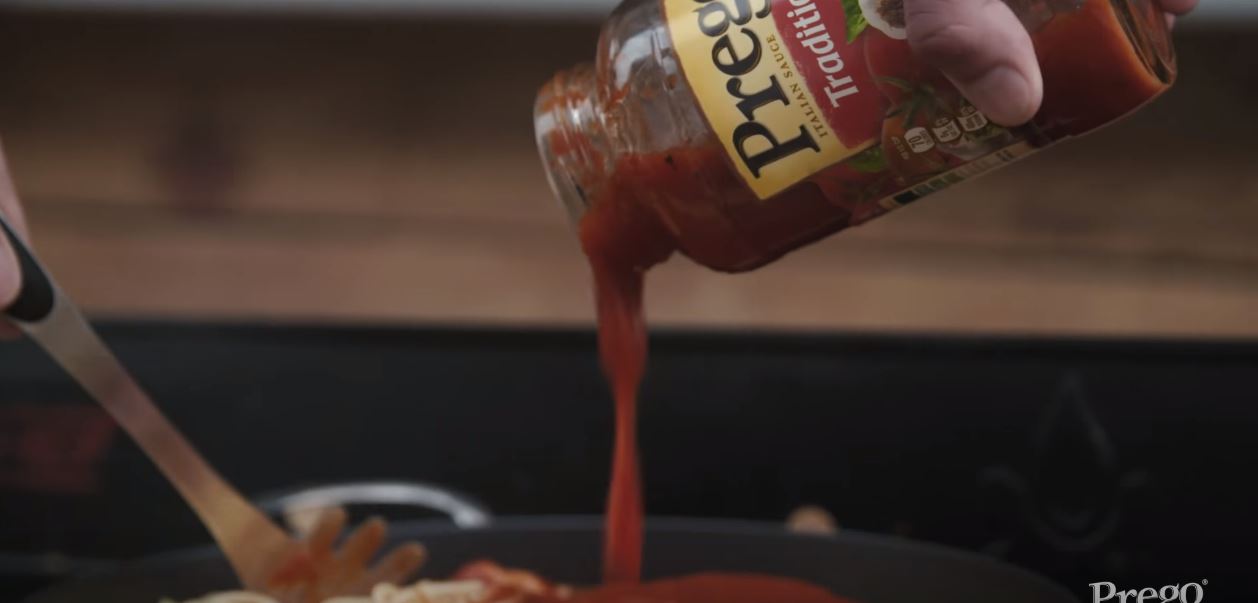It’s the type of TV commercial we’ve grown accustomed to: the mock feel-good reality event with actors portraying actual people. In this one for pasta sauce company Prego, my bullshit detector maxed out.
1 – An event crew sets up dinner. It’s well-staged, designed for effect: wood chairs with wicker seats, long wood table, colorful glasses. It feels traditional.
2 – Establishing shot of an unnamed East L.A.-type location.
3 – The previous shot featured street vendors in a vibrant community. Interesting to note that one version of the commercial says “San Diego” in the lower left; another version has “San Diego” stripped from it, or perhaps never added in the first place.
4 – Skateboarding student talks about how kids in his area don’t usually go to college.
5 – Another student talks about his anxieties in going to college: he’s feeling pressure because he doesn’t want to let people down.
6 – Students gradually begin arriving at the campus. We get a brief glimpse of a sign reading “UC San Diego International Faculty & Scholar Office.”
8 – Students settle into meal. A giveaway statement when student says that he learns “at every meal,” as if this were an on-going event.
9 – End: point made that you can make family in many ways. The family here is connected by the fact that all are the first in their families to go to college.
So What’s Really Going on Here?
Only after some digging did I discover that these are real high school students bound for college and, interestingly enough, it is a real event. Or at least a simulation of a real event.
Campbell’s (owner of Prego brand) press release says that the students come from San Diego-based Reality Changers, a charitable organization with a “mission to provide youth with academic support, financial assistance and leadership training to become college graduates.”
Reality Changers has done immense good work. Lately, though, its founder, Christopher Yanov, is being accused of running Reality Changers as his personal fiefdom–and a poorly run fiefdom at that. On July 14, 2017, four board members resigned, saying, of the founder, “…you have resisted our efforts to put the plans, processes and people in place to avoid the near-disasters of the recent past.” (emphasis added) My take: Reality Changers is a fantastically worthy organization, but it needs serious oversight before it goes over the precipice. Whatever the case, this article is not about Reality Changers.
Yin Rani, a Campbell’s marketing exec, says in the press release that it’s hard to be anxious when you’re “spilling crumbs or a little pasta-sauce splatter. Bringing people together more often to share a family meal is at the heart of Prego’s purpose.” I thought the heart of Prego’s purpose was to increase market share and return profits to Campbell’s, but I guess I was mistaken. The hashtag is #LoveTheSplatter.
The filmed event is based on real dinners that Reality Changers conducts on a regular basis.
The truly head-scratching thing about this commercial is its lack of context. Slathering your ad with too much information about the charitable partner reeks of astroturfing and can backfire on you. Viewers call instant bullshit on ads that cloak themselves in just a little bit too much of the charitable group. But this ad tips so far in the opposite direction that it looks fake. And the first shot, juxtaposing the Tuscany-worthy wood table with UCSC’s Brutalist architecture campus, does not help the viewer get off on the right foot.
The concept of “Welcome to the Family” is novel and refreshing: families aren’t just bound by blood but by shared experiences. Will Campbell’s explore other “families”?
Summary
Ad Drops: July 17, 2017
Ad Hits YouTube: July 23, 2017
Client: Campbell’s Soup
Brand: Prego
